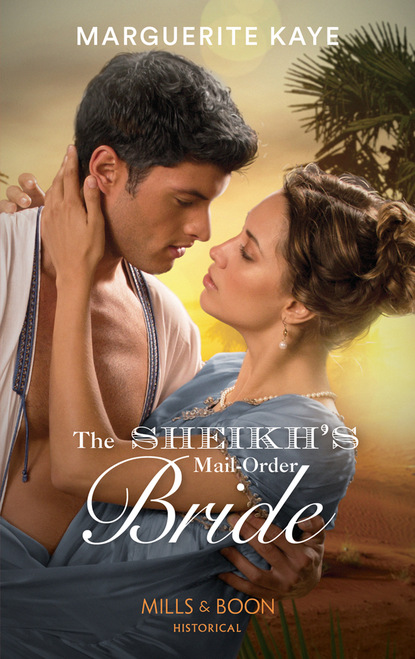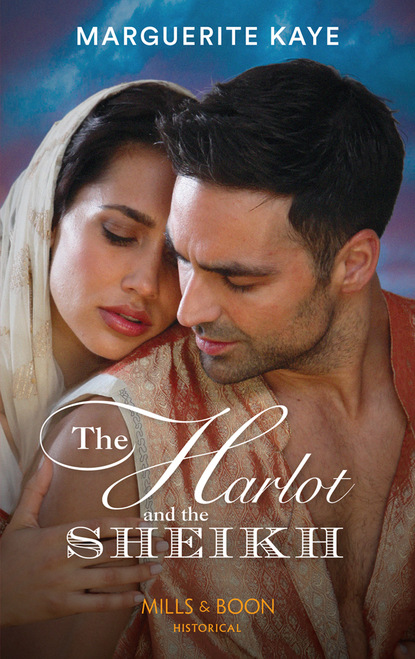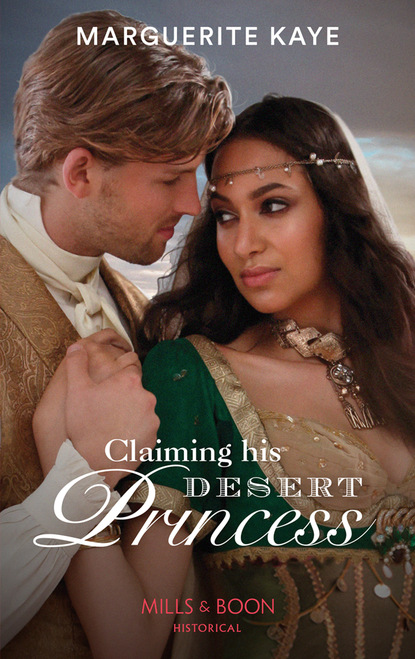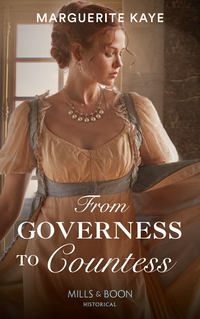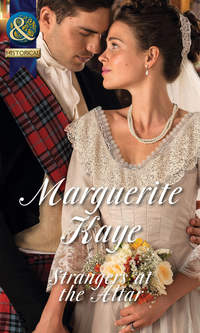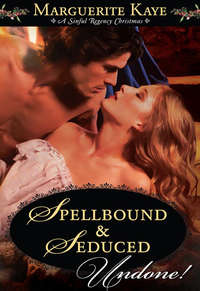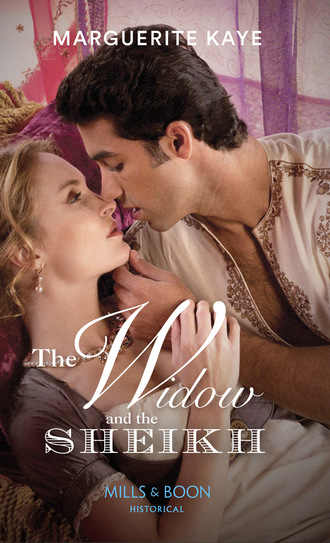
Полная версия
The Widow And The Sheikh
A husband who chose to subject his wife to poverty, whatever his scientific principles seemed a most relevant point to Azhar, but he refrained from saying so. ‘What, then, is the point?’ he asked.
‘A book. My husband’s book. His magnum opus. His life’s work.’ Julia gazed down at her lap, deep in thought for several minutes, before giving her head a little shake, as if to clear it. ‘It is a treatise. A comprehensive illustrated guide to rare and exotic species of the plant kingdom. But it is not yet complete, and it was his dearest wish—his dying wish—his only wish—that I complete it for him.’
Her tone confused him. Brittle. Perhaps she was simply trying not to become upset. ‘A compliment indeed,’ Azhar said, ‘to entrust the completion to you.’
Julia shrugged. ‘My father is a renowned naturalist, a specialist in the flora and fauna of Cornwall. The illustrations for his book on the subject were mine. I first met Daniel when Papa took him on as an assistant. Even before we were betrothed, I worked on specimen drawings for him, and for almost all of the seven years of our married life I have travelled with him, taking notes, drawing and painting. So you see, Daniel did not mean it as a compliment. There is no one more suited.’
Her explanation, the toneless voice in which she spoke, confused him even further. Emotionless, or too filled with emotion? Azhar had no idea. ‘This trip you have made, halfway across the world and all alone, it is then a pilgrimage of sorts?’
‘It is, in the sense that it is a journey I must complete. But only so that I may then start my own journey, free from encumbrance. My husband’s life’s work has perforce been my life’s work, and always will be until I complete this one final marital duty. But I grow weary of doing my duty. There, I have said it now. Finally, I have said it.’
She glared at him, daring him to speak, but Azhar was so taken aback at the change in her, he said nothing.
Julia appeared to take his silence for condemnation. ‘You think I’m callous, don’t you?’ she demanded. ‘You most likely think I’m selfish and unfeeling, but you don’t know the facts.’
She obviously wanted to tell him, however, and Azhar’s curiosity was now well and truly piqued. ‘What is it I don’t know?’
She hesitated only fractionally. He could see the point where she cast caution to the winds, and wondered if she was aware of how her face mirrored her emotions in a most transparent fashion. He suspected not.
‘Daniel made me promise him on his deathbed that I’d complete his masterpiece,’ Julia said. ‘On his deathbed, that was all he could think about—his book. So of course I promised, because how could I refuse a dying man’s last wish?’
What could he reply to such a question? The parallels with his own situation struck Azhar with some force. Was the universe playing a trick on him?
Fortunately, Julia did not seem to expect him to speak. ‘But that still wasn’t enough for Daniel,’ she continued. ‘I had to promise that I’d keep it a secret, even from my father, that he had not completed the treatise himself. I had to promise that I’d come here to Arabia alone to complete the missing chapters. I had to promise that I’d finish all the colour plates, make a fair copy of everything, and have it bound into two editions, folio and quarto. Daniel was most specific about the binding for each. And the named recipients. I had to promise that I’d obtain permission from Mr Joseph Banks, the president of the Royal Society, for a dedication, and I had to promise that I’d petition Mr Banks on Daniel’s behalf to sponsor him for posthumous fellowship.’ She broke off, frowning down at her fingers, which she had been using to count off each promise, and then her brow cleared. ‘Oh, yes, and I had to promise that I’d persuade Mr Banks to grant Daniel membership of the Horticultural Society of London.’
‘Your husband had great confidence in your powers of persuasion,’ Azhar observed.
‘No, Daniel had great confidence in the results of his years of exhaustive research,’ Julia replied. ‘To be fair, his book is an excellent work, and his categorisation is innovative too. It is his legacy to the scientific world, and does deserve to be recognised. I don’t expect to have any trouble persuading Mr Banks to grant his wishes.’
Julia pushed her hair back from her face, adjusting her position to face him more squarely. ‘You know, I always thought that it was a love of science that drove Daniel, wanting his work to be recognised in the rarefied echelons of the scientific and academic communities as one of the definitive reference guides in its field. I respected him for that, but I wonder now if it was fame he actually coveted, his name he wished to be remembered.’
Azhar was forming his own, extremely uncomplimentary opinion of Julia’s dead husband, but he wisely chose not to share it. ‘Does it make any material difference?’ he asked.
Julia pursed her lips, and then smiled. ‘You know, I don’t think it does. Whatever his reasons, my task remains the same.’
‘You have taken on a very heavy burden.’
‘I thought so at first, and indeed there are aspects of it which—but actually, I have found the experience of travel most liberating. I have not been at all lonely you know. In fact I’ve very much enjoyed my own company. And last night’s events aside, I have been quite captivated by the beauty of Arabia. Besides,’ she added, her smile becoming wry, ‘I had no option. One cannot refuse a dying man’s wishes.’
Azhar winced. Her words were so very nearly his exact thoughts on the summons that brought him here. Tomorrow—but he suddenly, desperately did not want to think of tomorrow. Not yet. ‘So it is at your husband’s command that you are here, alone?’
‘You’ll understand now why I found it somewhat ironic when you asked if I had his permission to travel,’ Julia replied. ‘Daniel is dictating my actions from beyond the grave just as effectively as he did before he passed away.’ Her mouth tightened. ‘But not for much longer. I’ll finish his book, I’ll make good on all those promises, and that will be an end of it. My whole life I have been doing another’s bidding, drawing and painting to order. First for my father, then for Daniel. I have earned my right to freedom, and by heavens, I am going to enjoy it.’
Freedom. These last ten years Azhar had believed himself free, but from the moment he’d opened that summons he knew he’d been fooling himself. Freedom required the severing of all ties, all burdens, the honourable discharge of duty, just as Julia said. The last ten years had changed him for ever, shaped him into the man he was now, living the life he wanted to live. It was not the summons itself, with the unwelcome and completely unexpected news it contained, nor was it the command from beyond the grave that drove him here. It was this need for an absolute ending, for true freedom, which had driven him so many miles across the desert sands.
He and Julia sought the same thing. ‘You crave your freedom. It would be churlish of me,’ Azhar said, ‘not to assist you in achieving that most desirable state of affairs.’
She beamed at him. ‘You’ll help me to find a guide, camels—and paints—will I be able to purchase paints?’
So little, she asked of him. She cared not for the dangers she had faced nor those to come, with her goal in sight. He, of all people, could understand that. He was forced to admire her. Her tenacity. Her fortitude. Her determination to make the best of an appalling lot. Not a tear had she shed. She had not theatrically thrown herself on his mercy, nor had she played the damsel in distress, though her situation would have been ample excuse to do so. She did not expect him to save her, she merely wished him to assist with providing her the means to save herself. She really was a most unusual female. ‘I will help you,’ Azhar said. ‘I will take you to Al-Qaryma, and there you will find all you require.’
Her face lit up. ‘Thank you, Azhar. Thank you so much.’
To his surprise, she grabbed his hand, pressing a kiss to his knuckles. Her mouth was warm on his skin. His body reacted instantly, sending blood coursing to his groin. Horrified, he snatched his hand away.
‘I’m sorry. I did not mean—I didn’t think—I...’
Her embarrassment fortunately masked his own discomfort. ‘It has been a long and emotional day.’ Azhar stirred the cooking pot. ‘You must be hungry. Let us eat, and then you must rest. We will start for Al-Qaryma at dawn.’
* * *
They ate directly from the cooling cooking pot using their fingers. Julia, by now accustomed to the practice, and remembering to use only her right hand, ate with relish, not at all concerned at the lack of cutlery or the need to share.
Her confession had given her an appetite. She couldn’t believe she had imparted all those intimate thoughts to this complete stranger. She had portrayed herself in a stark and very unflattering light. She was not at all proud of her feelings. She felt enormously guilty for even having them, never mind voicing them. Her resentment must have come over loud and clear, yet Azhar had not condemned her. On the contrary, he had seemed, from the little he had said, to be sympathetic to her stance.
Besides, it had felt good, finally, to articulate a little of what she was feeling. Daniel had reserved all his passion for his book, forcing her to bottle hers up. She had no idea if she was even capable of expressing it, for after that first time, the only time she’d ever dared to initiate any sort of intimacy and had been rejected, she had been careful not to alarm her husband with anything more than a tepid response to his own infrequent overtures. It seemed to satisfy him. Certainly he had never seemed dissatisfied, which was the same thing, wasn’t it?
Recalling the way her stomach had lurched when she had kissed Azhar’s hand, Julia wasn’t so sure. It had felt like some sort of alchemical reaction between her skin and Azhar’s. There had been a connection from his hand to her lips to her belly that set her blood tingling. And all she’d done was kiss his hand!
To her eternal embarrassment and his. What had possessed her? She slanted a look at him as he threw the remnants of their frugal meal towards his Saluki, and there was her explanation. Azhar was simply one of the most stunningly attractive men she had ever encountered.
One of the most intriguing too. He gave very little away. He was a rich trader. He was not married. He’d been away from this kingdom, his home, for ten years. That was the sum total of what she knew of him. The reason for his absence from home was definitely off the list of subjects he’d be willing to discuss however, and the last thing she wished to do was estrange him. Best if she stuck to more neutral topics.
‘Thank you very much,’ Julia said when he turned back to her, wiping his fingers on a large square of white lawn kerchief. ‘I don’t think I’ve ever eaten such a delicious hare.’
She was rewarded with a smile. ‘Not even a fat English one?’
‘Not even an enormous Cornish one,’ Julia said, laughing. She leaned back to gaze up at the night sky. ‘We had a telescope at our—my father’s—home in Marazion Bay, but the stars in the desert sky feel so close one almost doesn’t need one. I have tried to paint it, but it’s impossible to replicate such beauty.’
‘You do not confine your art to botanical specimens, then?’
‘I’ve had little time to paint anything else but—no, not wholly. When all this is over, I can paint what I like. And perhaps also what other people like too, since I’ll have to find some way of earning my living.’
Azhar frowned. ‘Your husband did not make provision for you?’
‘What little we had will be consumed by this trip and the production of his book. Daniel assumed I would return to live with my father.’
‘But you have other ideas?’
‘I love Papa, but I do not intend to substitute one master for another,’ Julia said wryly. ‘I do not mean to imply that he is unkind or uncaring. My father is, as Daniel was, a sort of—oh, a sort of benevolent autocrat. Kind, and caring, but utterly selfish. Papa and Daniel both assumed my time theirs, their wishes mine. It never occurred to either of them that I might have wishes of my own. You see, a benevolent autocrat.’
‘You have a peculiarly apt way of describing things.’
‘But you understand? Your own father...’
‘Is dead.’
Once again, his expression was blank. He hadn’t moved, but she felt as if he had physically detached himself. It was an extremely effective method of closing down a subject, though it sent her curiosity soaring. Julia reminded herself of the need to keep him on her side. Silence stretched and became uncomfortable. She had to think of something to say. Anything.
‘Are you familiar with the botanical gardens in Cairo, Azhar?’
A blank look was her answer.
‘They were first established during Napoleon’s occupation. A Monsieur Delile was the director then, a correspondent of my husband’s. Monsieur Delile wrote the botanical chapters of Travel in Lower and Upper Egypt, you know.’
‘No, I did not.’
‘And you do not care to know,’ she said, deflated. ‘You would rather be alone.’
‘No!’ Not only Julia, but the Saluki hound flinched at this harsh exclamation. Azhar grimaced. ‘Forgive me. This journey has been—I have been—’ He broke off, shaking his head. ‘Please. Stay a while. Tell me—tell me a little more of your own journey. Did you stop in Cairo on your way to Damascus? It is a city I know well. One of my residences is on the outskirts.’
Julia eyed him warily. She was far more interested in what it was, precisely, about this journey that made him so—so edgy, yes that was it. But already, she knew him well enough not to pursue the subject. ‘You have more than one residence, then? I assume that trade—whatever you trade in—is lucrative?’
‘Silks and spices, mostly. I work hard but yes, it is lucrative. Though I travel a good deal, and have other residences in Damascus and Naples, I spend several months of the year in Egypt. I am well acquainted with Colonel Missett, your Consul-General, though apparently he is shortly to be replaced by a new man, Salt.’
‘I didn’t know that. Do you by any chance mean a Mr Henry Salt? It is such an unusual name, I wonder if it might be the same person.’
Azhar raised his brow. ‘You know him?’
‘A little. I have read his Voyage to Abyssinia, naturally.’
‘Naturally?’
Julia grimaced. ‘Naturally, because Mr Salt is—was—another of my husband’s correspondents.’
‘In fact, I too have read Mr Salt’s account of his voyage to Abyssinia. It is a country with which I trade. I found his insights—interesting.’
‘You mean they were in opposition to your own?’
‘Our experiences of the country were very different.’
‘You mean because your interest in the country is primarily commercial? From what I understand, a large part of Mr Salt’s mission there was to promote trade too. Will you be cultivating his acquaintance in Cairo? Though I believe it is the Pasha who holds the real power there. Are you...?’
Azhar laughed. ‘Yes, I am very well acquainted with him also. In my line of business it pays to be as well connected as possible. Permit me to tell you, madam—Julia—that you are a most singular female.’
‘I don’t know whether that is a compliment or an insult.’
‘A compliment,’ Azhar said, ‘most assuredly, a compliment.’
In the firelight, his eyes seemed like molten gold. She knew she must be imagining the flicker of desire in them, it was the firelight reflected, but for a moment she allowed him to hold her gaze, to imagine what it would be like if he leaned over, closed the distance between them, touched his mouth to hers. Her stomach knotted, making her shiver.
Then reality intervened. Recalling the way he’d snatched his hand away from her earlier, Julia scrabbled to her feet, breaking the spell which could only have been one-sided. ‘It is late, and I am very tired.’
Azhar too got to his feet, with a feline grace she could never hope to emulate. ‘We will set out at dawn.’
‘What about my things—the tent, my clothes...?’
He waved his hand dismissively. ‘My mules can carry your personal effects. I will send someone for the remainder.’
Send someone! So he had family in this city they were visiting. Julia added this snippet to the very small list of things she knew of him. ‘Thank you,’ she said. ‘For coming to my rescue today. For promising to help me when you have business of your own to attend to, and I’m sure the last thing you wish is to be encumbered with an inconvenient Englishwoman.’
‘Cornish,’ Azhar said softly. ‘Goodnight, Julia.’
‘You have not set up your tent.’
‘Goodnight, Julia,’ he said, firmly this time.
He meant to stand guard. And he wanted to be alone. And he didn’t want her commenting on it either. She was getting rather good at understanding his silent communication method. ‘Goodnight, Azhar.’
* * *
It had been a very long day. Clinging to the camel’s hideously uncomfortable box seat behind Azhar, her bottom quite numb, Julia tried to ignore the increasing queasiness that assailed her as they swayed alarmingly atop the beast. The well-named ship of the desert was making her seasick. She would have given much to have been able to travel on one of the pack mules as had become her custom, but with her few remaining personal possessions to add to their existing burden, it had not been possible.
The initial excitement of sitting so intimately close to Azhar, their bodies perforce pressed together, had quite worn off. She was unbearably hot in her woollen skirt and jacket. The sheet which he had formed into a headdress for her provided much more protection from the sun than her hat, but her head was thumping all the same, her eyes were gritty with sand, and her skin damp with sweat. She had never in her life felt so unattractive.
In stark comparison, Azhar was even more good-looking in the daylight. His skin was burnished bronze, the colour of the sand dunes in the shade. His eyes gleamed, dark gold like the sun. His hair seemed almost blue-black, a sleek glossy cap when he took off his headdress to refold it. She couldn’t see a single drop of perspiration on his brow, while in contrast her hair clung in lank tendrils to her forehead and her nape. It was so unfair, and really quite irritating, the way he seemed quite unaffected by the heat, drinking sparingly from his goatskin flask when they stopped, while she had to fight not to empty hers in one long, greedy gulp.
When the sun was at its zenith they had temporarily broken their journey, but Julia had the distinct impression this was for her benefit only. While she dozed fitfully in the shade, Azhar sat staring out at the desert wastes. The frown creasing his brow, the way his mouth was set, gave an austerity to his features today, making him more intimidating rather than handsome. She had a hundred questions to ask, not least of which was where she would spend the night, but with every mile they covered, he grew more distant and remote.
‘Al-Qaryma.’ Azhar brought the camel to a halt at the top of a sand dune, waking Julia from her I-am-not-going-to-be-sick trance, clicking his tongue to bring his camel to its knees and dismounting with annoyingly fluid ease, before helping her to scrabble awkwardly down.
One look at the view, however, and she forgot all about her nausea. The small city rose dramatically from the verdant green fields surrounding the large oasis, which shimmered in the late afternoon sun. Clusters of buildings hugged the contours, interspersed with the sparkle of fountains, connected by dusty grey ribbons which were the narrow winding roads. And above them all, sitting at the top of the low hill, was a huge palace, the domed roofs glittering white, the towers which fronted it trimmed with emerald and gold. ‘It’s beautiful,’ Julia said, gazing entranced. ‘It’s like a magical city, rising up out of the desert. My goodness, how you must have missed it. If this was my home, I don’t know if I’d be able to tear myself away from it, never mind stay away for ten years.’
Azhar was staring at the view, his frown so deep it brought his brows together. ‘It is undeniably beautiful, but a gilded cage is still a cage,’ he said.
‘What a strange thing to say. Whatever do you mean?’
‘What I mean is that this city is no longer my home. This kingdom no longer forms the limits of my horizon,’ Azhar said. ‘I have no home. I have no people. I have no country. I answer to no one. My heart and my life belong to me alone.’
‘You must lead a very lonely life.’
His smile was fleeting but unmistakably sensual. ‘My determination never to burden myself with a wife does not preclude my enjoying the company of women.’
‘I doubt you’ve enjoyed the company of this particular woman,’ Julia responded tartly, because that smile was making her tingle. ‘I’ve been nothing but an inconvenience.’
He shook his head. ‘You underestimate yourself.’
Was he teasing her? He could not seriously mean he enjoyed her company. His attention had turned back to the view of the city. His expression was almost impossible to read. ‘Azhar, what has brought you back here? You have been away for so very long.’
‘Not long enough. I never believed I would return. You know, the parallels of our situations struck me forcibly last night,’ he said bleakly. ‘In fact, you will be surprised to know that my reasons for this journey are very similar to yours. I too come in order to secure my freedom. I am also here at the behest of a dead man.’
‘What can you mean? What dead man? Azhar...’
But he was already walking towards the camel. ‘No more questions. Now is the time for action. All will become clear in due course.’ He clicked his tongue and the ship of the desert once more dropped obediently to its knees.
Completely at a loss, Julia allowed him to lift her on to the camel. He mounted in front of her, and set the beast back on its feet. Their little caravan headed down into the valley, past the blue pool of the oasis, the vibrant green of the irrigated fields, and Julia, her head spinning with the onslaught of colour and scents, focused on staying upright in the saddle.
Questions jostled for room in her head, but there was no prospect of answers for the moment. On they went, through the winding streets, past piazzas with tinkling fountains, souks closed now for the day, the air still redolent with the cinnamon and mace, cardamom and cumin they had been selling. People were staring. In fact, a lot of people were staring, nudging each other, summoning yet more people. It was unusual for a woman to ride on the same camel as a man—that much Julia knew. Was that all it was? Perhaps their interest was exacerbated by her Western clothing. In all likelihood they had never seen a Western woman before. Yes, that was it. Though it was beginning to look as if the entire city was turning out to look at them as they passed.
Feeling extremely uncomfortable and extremely anxious, Julia was thankful to be able to hide behind her improvised veil. Azhar, she only then noticed, had not covered his face. Risking a glance back, she saw that they were being followed by a growing crowd. The nudges, the murmurings and mutterings were perfectly audible even above the hooves of the mules and camels, but Azhar looked resolutely straight ahead, his gaze unswerving. On they went, and the trail of people behind them turned into a procession, the mutterings and murmurings a sort of wailing—no, not wailing. It was not an unhappy sound. She could not see the women’s faces, but the men were smiling, the children were laughing.
‘Azhar,’ Julia hissed, ‘what is going on?’
Still he remained silent. Still they continued on. In front of their little caravan, the inhabitants of Al-Qaryma threw themselves down on to their knees. Someone had strewn rose petals in their path. Rose petals! Julia could hear singing from the human tide of people behind them. Bells began to peal. This was more, much more than mere hospitality. It was not Julia they were interested in either, but Azhar. Ten years he had been gone, yet all these people had come out of their houses to celebrate his return. Why? Who on earth was he?


